Words the Left Uses Against Us
Jared Taylor, American Renaissance, December 1, 2023
It controls your thoughts by controlling your language.
This video is available on Rumble, BitChute, and Odysee.
In his famous essay, “Politics and the English Language,” George Orwell wrote that the English language was becoming “a catalogue of swindles and perversions.”

He added that “the slovenliness of our language makes it easier for us to have foolish thoughts.” And that, dear reader, was in 1946.
The Left has a genius for “swindles and perversions.” It is always inventing new words in its fight against reality. A pioneering example was the word “racism.” It didn’t exist until 1934, when the German-Jewish medical scientist Magnus Hirschfeld wrote a book, which was translated into English with the title Racism.

Credit: Wellcome Images via Wikimedia Commons, CC BY 4.0 DEED
It may be hard to believe, but the United States managed to institute and abolish slavery, set up Jim Crow, and segregate schools and neighborhoods without once using a word that society considers indispensable today. How did we manage?
Since then, the word has had a very good career. This is a graph of the word’s percentage of all words used in American books since the word was invented. This is a percentage, so it’s a direct measure of the popularity of the word, not of the increase in the number of books. The data are from Google Books. Unfortunately, they don’t go past 2019.
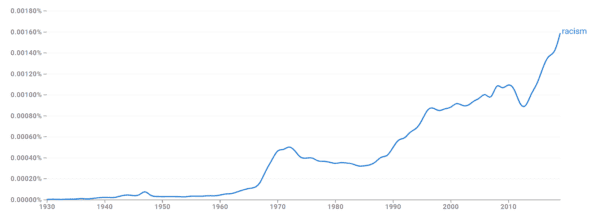
As you can see, the word really took off in the 1960s, during the “civil rights” movement, and has been climbing steeply since 2012. It’s a real pity we don’t have data after the May 25, 2020 martyrdom of George Floyd. There must have been a huge surge.
However, “racism” has lost a lot of its sting through overuse. If everything’s racist, nothing is racist, so “white supremacy” is in vogue, because it evokes slavery and lynching.
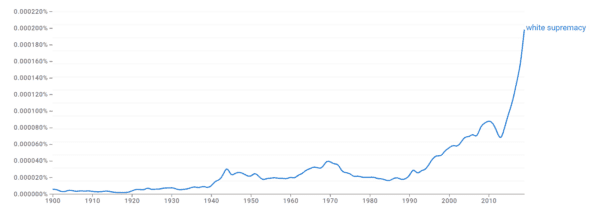
It’s a real word, which goes back to before 1900, and means whites ruling over non-whites, as in colonialism. It’s shooting up, with no end in sight.
“Institutional racism” was invented in the late 1960s, but it took another 20 years for liberals to discover “systemic racism,” which is coming on strong, but neither can compete with the emotional power of “white supremacy.”
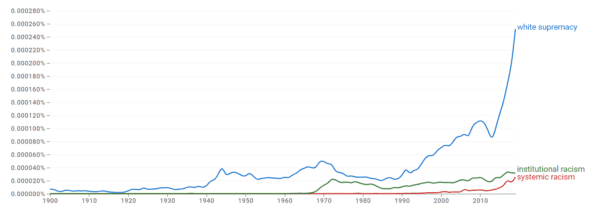
And neither of these newfangled, invented forms of racism — systemic or institutional — can compete with “white privilege,” the orange line, which goes all the way back to the late 1980s. “Implicit bias” — the blue line — didn’t really take off until 2000, but it has surged ahead of the venerable “institutional racism.”
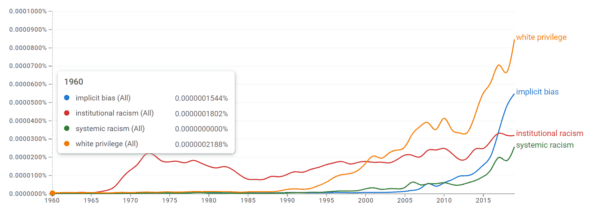
Very impressive. Remember, not one of these words even existed before 1960, and every one is a lefty invention.
“Enslaver” and “enslaved person” have hit the big time, especially since 2015. The Left loves these words because it thinks “slave” sounds like a permanent, inherent status, whereas “enslaved person” puts the emphasis on “person,” and “enslaved” is supposed to sound like an evil imposition.
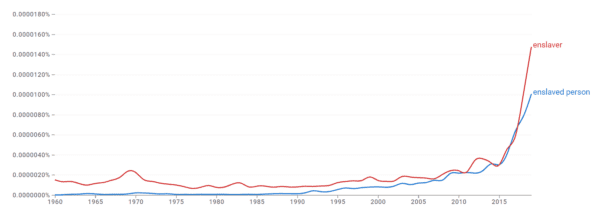
Enslaver is the nasty new word for slaveholder, and is supposed to make it sound like anyone who owned a slave, even if he inherited one, was an “enslaver,” out in the jungle catching black people.
Now, I’ll add the traditional term, “slaveholder” to the comparison.
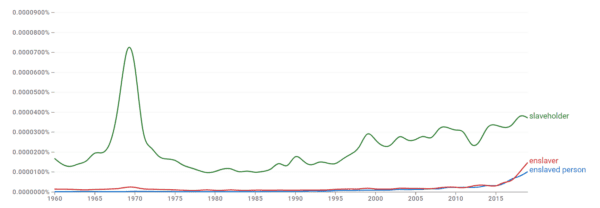
As you can see, it had a tremendous surge during the “civil rights” era, and was no doubt a reminder to white people about how bad their ancestors were, and encouraged them to accept new laws and to get used to race preferences for blacks. “Slaveholder” then began to drop out of sight but started coming back in the 1990s.
This is what you get if you combine “slaveholder” and “enslaver.” Isn’t it curious that the further we get from real slaveholders, the more we talk about them?
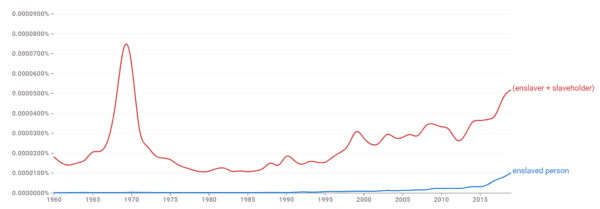
There’s no mystery in that. Talking about slavery is one of the best ways to soften up whites for reparations, minority status, and general humiliation and dispossession.
Here is an interesting comparison. The relative frequencies of “Negro,” capitalized and lower case, all the way back to 1890.
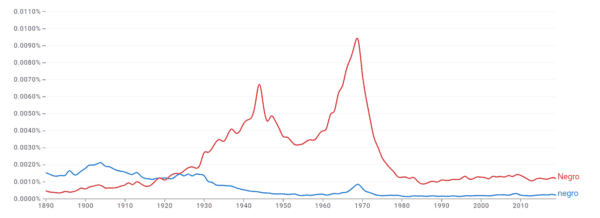
As you can see, back then, a lower-case N, the blue line, was more common, but upper-case N took off in the 1920s, and hit its peak in 1970. And then crashed. Negro suddenly went out of fashion.
You can throw in “black” for comparison. It used to be mostly just a color, but as Negro went out of fashion it became a race and has gone from strength to strength.
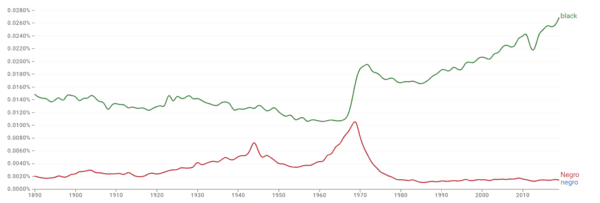
Racism, as we know, almost always means bad white people. Are there words for racism against white people? I can think of only “reverse racism” and “anti-white racism, and at least “reverse racism” is making a little headway.
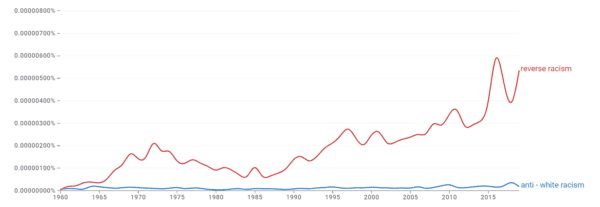
But look at this: compared to “racism,” these words occur at a statistical rate of zero. The Right is no match for the Left.
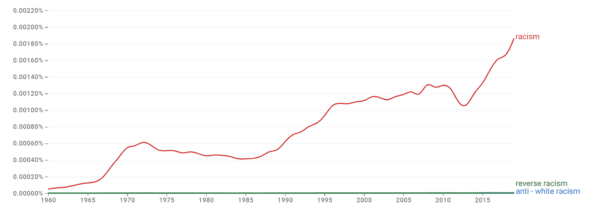
Let’s have a little fun with some other expressions the left invented. How about “toxic masculinity”? It’s a brand-new discovery, coming along very nicely!
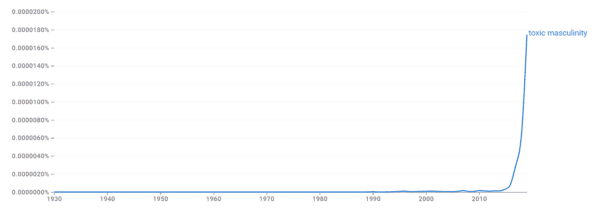
Let’s add a few phobias, because as time goes on, we apparently become frightened of more and more things – such as transphobia, which is a young word, but off to a fine start.
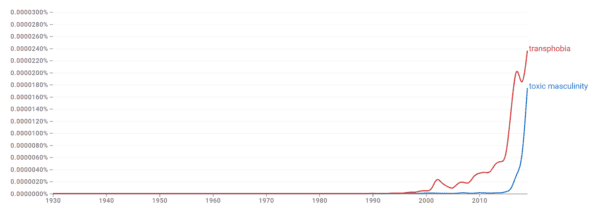
To that let us add Islamophobia, which was discovered about the same time, but is clearly a winner.
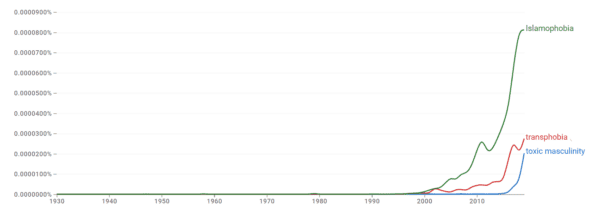
But it’s a piker compared to “xenophobia.” And look at that pedigree – all the way back to the 1930s.
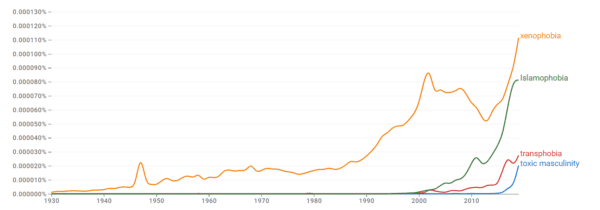
Look out for “homophobia,” though, which lefties had already invented in the 1970s.
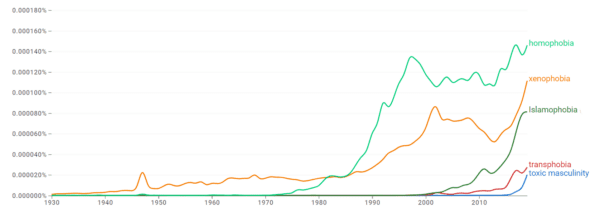
Look at this upstart: Intersectionality.
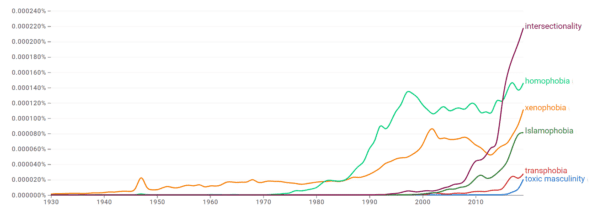
It wasn’t heard of until 1995, but lefties now can’t do without it. Still, the leader of this pack remains white supremacy.
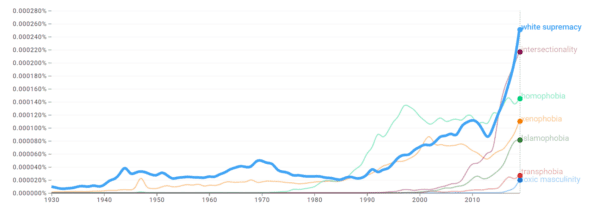
Of all the things we’re supposed to hate, white supremacy is the worst. Well, not quite.
Add the various spellings and capitalizations of antisemitism, and look what you get. My, oh my. It’s number-one and nothing else comes close.
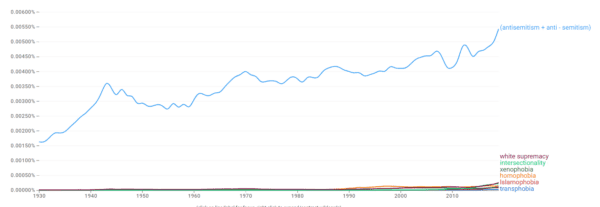
And the problem appears to be getting worse by the moment. Even the perennial, all-purpose “racism,” there in blue, is way behind.

Let’s look at a few more ways the language has changed. I’ll take antisemitism and racism off the chart so you can see everything else better and instead add “the homeless” in blue.
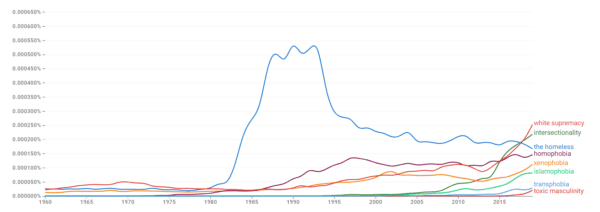
As you can see, they got a lot of attention from about 1980 to 1995, but the ardor for them cooled just as we discovered intersectionality, white supremacy, and assorted “phobias.” And weren’t there any “homeless” before 1980? Of course, but we called them bums, winos, derelicts. They were all promoted to “homeless,” which is more “sensitive,” and makes it sound as though they used to live in beautiful homes that blew down in a hurricane.
Here, for example, is how “homeless person” suddenly appeared around 1980 and has eclipsed “wino.”

There’s great news on mental retardation. It looks like we have cured the problem.
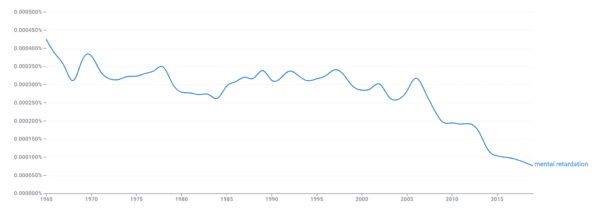
Well, no, we just changed the way we talk about it. I figured the new, sensitive lingo would be “mental handicap” and “learning disability,” but that doesn’t nearly make up for it.
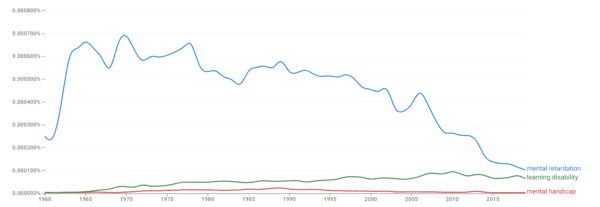
Apparently, the new expression is “intellectual disability,” though that doesn’t seem to cover it either.
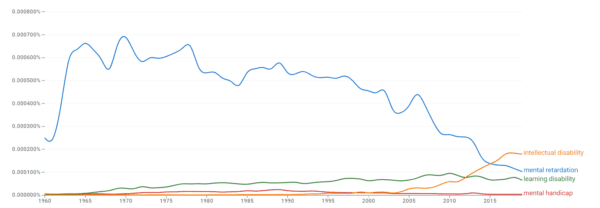
Maybe modern talk about autism and ADHD takes up some of the slack.
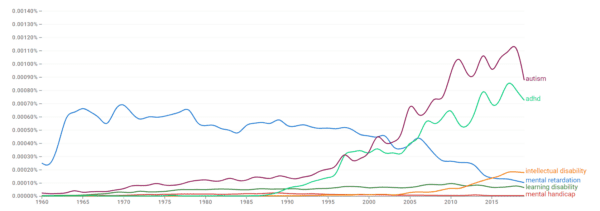
I suspect we are getting both mentally unhealthier and inventing more ways to talk about it.
So, the Left does tricky things with language. It softens the words we use for people for whom the Left thinks we don’t care enough about: bums become “the homeless” and “mental retards” have an “intellectual disability.” But the real genius of the Left is in deciding to hate something ancient and normal, inventing a new name for it, and calling it a moral failing.
It’s normal to think homosexuality is abnormal and to hope your children don’t turn out that way, but now that’s a moral failing known as “homophobia.”

Credit Image: © Andre Lucas/dpa via ZUMA Press
It’s normal to notice that foreigners are different from us and to prefer our own people but that’s “xenophobia.”

Credit Image: © Biswarup Ganguly/eyepix via ZUMA Press Wire
It’s normal to notice race and to prefer one’s own race, but that’s racism – etc., etc.

We don’t have words to describe normal people because we never needed words for them. We don’t have a special expression for people who put their pants on one leg at a time.
At least for now, there is no word that implies it is a crime to love your own children more than you love other people’s children, but it’s easy to imagine some lefty, collectivist child-rearing society in which it was a crime.

People who suffered from that disorder might be called “familists,” and be scorned and canceled. And what would they call themselves? There is no word for normal people.
It’s the crazy, new, leftist disorders that need names. You could call people who put the interests of other races or of foreigners ahead of theirs “ethnomasochists” or “xenophiles,” but Google Books has never heard of those words. Good luck trying to popularize “toxic femininity.”

This is really just another way of measuring media dominance. Those who control our words control our thoughts. What did Orwell call the English language in 1946? “A catalogue of swindles and perversions.” In this century, I would go further than Orwell when he said “the slovenliness of our language makes it easier for us to have foolish thoughts.” The viciousness of our language makes it easier for us to have self-destructive, even suicidal thoughts.















